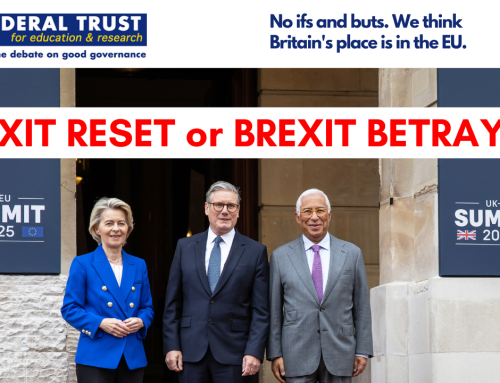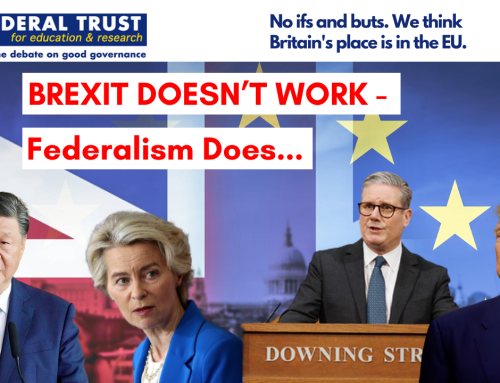The UK Brexit Campaign Is Starting To Fracture
12 June 2017
This article was first published on Social Europe
The atmosphere of confusion, uncertainty and outright division which has long marked the UK Brexit campaign is now fated to become still more confused, uncertain and divisive. The Parliamentary deadlock following the prime minister, Theresa May’s ill-fated decision to call an unnecessary general election, will make it even more difficult for the UK’s EU partners to understand what exactly the British want.
May’s prospects of political survival now depend on a ‘deal’ with the hardline Northern Ireland Democratic Unionist (DUP) party providing a tiny Parliamentary majority which the Tories lack on their own. But this may only extend the life of what increasingly looks like a doomed administration for a few months.
One key question being asked is: “Does the election outcome increase the odds of a ‘hard’ or a ‘soft’ Brexit?” It is a question that May has so far been unable or unwilling to answer. But it is the central question which Britain’s EU partners have a right to know in making plans for the future.
May cannot answer the question unambiguously because her own party simultaneously wants both. At present the ‘Hard Brexiteers’ seem to be in a majority in the Tory party. They welcome the prospect of an alliance with the DUP because it too wants to leave the EU.
The trouble for the DUP is two-fold. Its leaders know that a big majority of the people in Northern Ireland voted in the referendum last year to Remain in the Union. Moreover, the DUP is a Leave party with a difference: they do not want a hard border with the Republic of Ireland even if this requires virtually full participation in the EU Single Market and Customs Union.
The DUP is in many respects a pre-modernist political party opposed to abortion, gay rights and with a dubious commitment to civil liberties. But since part of its electoral base is drawn from sections of the Protestant working class in the north of Ireland, it will probably insist on changes to May’s policies on social welfare, pensions and economic austerity in a direction she may not like.
An early Tory leadership coup d’etat cannot be excluded. The trouble is that the Conservative party appears more than usually lacking in obvious alternative leadership candidates. In the political corridors of power, the word is that the Conservatives may accept the need to co-exist with May for a few more months – in spite of her disastrous general election performance.
What are we waiting for?
On that basis the formal start to the Brexit negotiations should still get under way as planned in Brussels next week. But Michel Barnier, Jean-Claude Juncker and the other EU designated Brexit negotiators may still be little wiser about what the British government either wants or might be willing to settle for.
That said, the balance of the different risks now facing the future of the May government – even of the longer term Conservative party political project – does hint at some downplaying of the attractions of a hard Brexit. It increases the odds on the UK now opting for something pretty close to full participation in both the EU Single Market and Customs union.
That, of course, will mean the UK having to accept the obligations which go with any such privileged access – acceptance of EU law and jurisdiction by the European Court of Justice, settlement in full of outstanding debt to the EU and continued de facto EU budget payments for participation in cooperative projects in the fields of science, research and environmental protection.
If and when such an agreement is reached it will have to include a possibly lengthy transitional period – to prepare the UK for life outside the EU – which could be longer than London envisages and during which the EU legal system will remain in force.
The powerful Eurosceptic right wing of the British Tory party will be very quick to pick up on any first slight sign of a new, more compromising line emerging in Brussels from the UK negotiators. When they do, one may expect the Tory party to return in short order to its habitual state of internal civil war.
Given this prospect, May may find it expedient to throw in the towel before she gets her eviction notice from Number 10 Downing Street. Whoever then has to accept this poisoned chalice will have little reason to be grateful.
Taken together, the political odds now seem to point to a second UK general election later this year. The voting public may well be unenthusiastic at this prospect. But, if it becomes unavoidable, the odds must be on a second election returning a Labour government led by its left wing leader, Jeremy Corbyn, whose brilliantly successful election campaign has stunned most of the British political establishment and media commentariat.
If Corbyn does take over the Brexit negotiations we can expect a far more emollient approach to the final agreement. Indeed, it may be indistinguishable in essentials from the agreements the EU already has with Norway. But a Corbyn-led Labour government would be more committed to work with the EU to achieve higher common social, economic, environmental standards.
Such an agreement might look to some very much the same as full EU membership – but without the UK have any vote on decision making. But Corbyn is likely to be able to win public backing for this in a way that neither May or any likely successor could be expected to do. Perhaps then the debate in Britain will move in full circle to one about the merits of seeking to rejoin the Union?
About John Palmer
John Palmer was the European Editor of The Guardian and then Founder and Political Director of the European Policy Centre. He is a Visiting Practitioner Fellow at Sussex University’s European Institute and a member of the Council of the Federal Trust in London.






